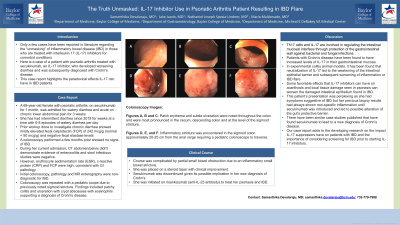Monday Poster Session
Category: IBD
P2262 - The Truth Unmasked: IL-17 Inhibitor Use in Psoriatic Arthritis Patient Resulting in IBD Flare
Monday, October 23, 2023
10:30 AM - 4:15 PM PT
Location: Exhibit Hall

Has Audio

Samanthika S. Devalaraju, MD
Baylor College of Medicine
Houston, TX
Presenting Author(s)
Samanthika S. Devalaraju, MD, Jake Jacob, MD, Nathaniel Spezia-Lindner, MD, Maria Maldonado, MD
Baylor College of Medicine, Houston, TX
Introduction: Only a few cases have been reported in literature regarding the “unmasking” of inflammatory bowel disease (IBD) in those who are treated with interleukin 17 (IL-17) inhibitors for comorbid conditions. We present a case of a patient with psoriatic arthritis treated with secukinumab, an IL-17 inhibitor, who developed worsening diarrhea and was subsequently diagnosed with Crohn's disease. This case report highlights the paradoxical effects IL-17 can have in IBD patients.
Case Description/Methods: A 68-year-old female with psoriatic arthritis, on secukinumab for 1 month, was admitted for watery diarrhea and acute on chronic lower abdominal pain for 3 weeks. She has had intermittent diarrhea since 2019 for weeks at a time with 6-8 episodes of watery diarrhea per day. Prior workup done to investigate chronic diarrhea showed mildly elevated fecal calprotectin (FCP) of 242 mcg/g (normal < 50 mcg/g) and negative fecal elastase levels. A colonoscopy performed in 5/2022 showed no signs of IBD. During her current admission, CT abdomen/pelvis didn't demonstrate evidence of enterocolitis and stool infectious studies were negative. However, erythrocyte sedimentation rate (ESR), c-reactive protein (CRP) and FCP were high, consistent with GI pathology. Initial colonoscopy, pathology and MR enterography were non-diagnostic for IBD. Colonoscopy was repeated with a pediatric scope due to previously noted sigmoid stricture. Findings included patchy colitis and ulceration with crypt abscesses with eosinophils supporting a diagnosis of Crohn's disease. Her course was complicated by partial small bowel obstruction due to an inflammatory small bowel stricture. She was placed on a steroid taper with clinical improvement. Secukinumab was discontinued given its possible implication in her new diagnosis of Crohn's and she was initiated on risankizumab (anti-IL-23 antibody) to treat her psoriasis and IBD.
Discussion: Secukinumab has been used to successfully treat autoimmune-mediated disorders. However, some favorable effects that these medications can have on acanthosis and local tissue damage seen in psoriasis can worsen the damaged intestinal epithelium found in IBD. This patient’s presentation corroborated this, as secukinumab introduction led to worsening intestinal inflammation and alteration of the gut’s protective barrier. Our case report adds to the developing research on the impact IL-17 suppressors have on patients with IBD and the importance of considering screening for IBD prior to starting IL-17 inhibitors.

Disclosures:
Samanthika S. Devalaraju, MD, Jake Jacob, MD, Nathaniel Spezia-Lindner, MD, Maria Maldonado, MD. P2262 - The Truth Unmasked: IL-17 Inhibitor Use in Psoriatic Arthritis Patient Resulting in IBD Flare, ACG 2023 Annual Scientific Meeting Abstracts. Vancouver, BC, Canada: American College of Gastroenterology.
Baylor College of Medicine, Houston, TX
Introduction: Only a few cases have been reported in literature regarding the “unmasking” of inflammatory bowel disease (IBD) in those who are treated with interleukin 17 (IL-17) inhibitors for comorbid conditions. We present a case of a patient with psoriatic arthritis treated with secukinumab, an IL-17 inhibitor, who developed worsening diarrhea and was subsequently diagnosed with Crohn's disease. This case report highlights the paradoxical effects IL-17 can have in IBD patients.
Case Description/Methods: A 68-year-old female with psoriatic arthritis, on secukinumab for 1 month, was admitted for watery diarrhea and acute on chronic lower abdominal pain for 3 weeks. She has had intermittent diarrhea since 2019 for weeks at a time with 6-8 episodes of watery diarrhea per day. Prior workup done to investigate chronic diarrhea showed mildly elevated fecal calprotectin (FCP) of 242 mcg/g (normal < 50 mcg/g) and negative fecal elastase levels. A colonoscopy performed in 5/2022 showed no signs of IBD. During her current admission, CT abdomen/pelvis didn't demonstrate evidence of enterocolitis and stool infectious studies were negative. However, erythrocyte sedimentation rate (ESR), c-reactive protein (CRP) and FCP were high, consistent with GI pathology. Initial colonoscopy, pathology and MR enterography were non-diagnostic for IBD. Colonoscopy was repeated with a pediatric scope due to previously noted sigmoid stricture. Findings included patchy colitis and ulceration with crypt abscesses with eosinophils supporting a diagnosis of Crohn's disease. Her course was complicated by partial small bowel obstruction due to an inflammatory small bowel stricture. She was placed on a steroid taper with clinical improvement. Secukinumab was discontinued given its possible implication in her new diagnosis of Crohn's and she was initiated on risankizumab (anti-IL-23 antibody) to treat her psoriasis and IBD.
Discussion: Secukinumab has been used to successfully treat autoimmune-mediated disorders. However, some favorable effects that these medications can have on acanthosis and local tissue damage seen in psoriasis can worsen the damaged intestinal epithelium found in IBD. This patient’s presentation corroborated this, as secukinumab introduction led to worsening intestinal inflammation and alteration of the gut’s protective barrier. Our case report adds to the developing research on the impact IL-17 suppressors have on patients with IBD and the importance of considering screening for IBD prior to starting IL-17 inhibitors.

Figure: Colonoscopy images. Inflammatory stricture was encountered in the sigmoid colon approximately 20-25 cm from the anal verge (D, E and F) requiring a pediatric colonoscope to traverse. Patch erythema and subtle ulceration were noted throughout the colon and were most pronounced in the cecum, descending colon (A, B and C), and at the level of the sigmoid stricture.
Disclosures:
Samanthika Devalaraju indicated no relevant financial relationships.
Jake Jacob indicated no relevant financial relationships.
Nathaniel Spezia-Lindner indicated no relevant financial relationships.
Maria Maldonado indicated no relevant financial relationships.
Samanthika S. Devalaraju, MD, Jake Jacob, MD, Nathaniel Spezia-Lindner, MD, Maria Maldonado, MD. P2262 - The Truth Unmasked: IL-17 Inhibitor Use in Psoriatic Arthritis Patient Resulting in IBD Flare, ACG 2023 Annual Scientific Meeting Abstracts. Vancouver, BC, Canada: American College of Gastroenterology.
